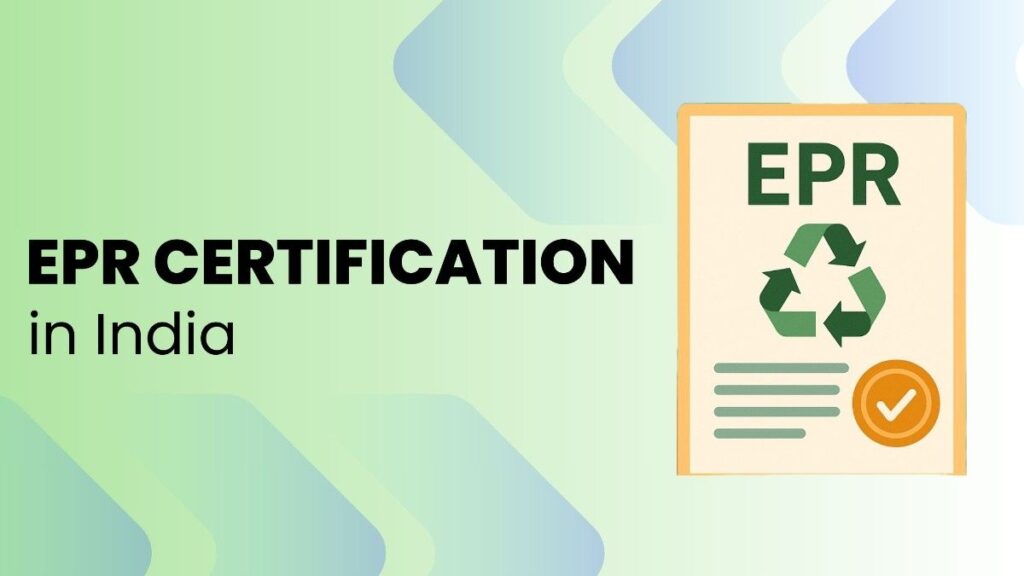- Home
- About Us
- Services
- Blogs
- Be our Partner
- Testimonials
In recent years, India has tightened its environmental compliance framework with a focus on Extended Producer Responsibility (EPR). According to the Central Pollution Control Board (CPCB), the number of EPR registrations grew by more than 35% in 2024 compared to 2023, showing how quickly businesses are adapting. Whether you are an importer, manufacturer, or brand owner, EPR certification is no longer optional — it is mandatory for operating in many regulated sectors like electronics, plastics, batteries, and tyres.
This blog will explain what EPR certification is, who needs it, the types of certifications, the step-by-step registration process, the documents required, the fees, and the penalties. Most importantly, we’ll show you how Green Permits makes EPR compliance hassle-free.

EPR stands for Extended Producer Responsibility. It is a legal obligation placed on producers, importers, and brand owners to ensure that waste generated from their products — after the end of their life — is collected and responsibly recycled.
The EPR certification is the official authorization issued by CPCB or the State Pollution Control Boards (SPCBs), allowing a business to operate in compliance with waste management rules. It proves that the company has committed to recycling targets and will manage post-consumer waste through approved channels.
In short, EPR certification is the license that ensures your business meets India’s sustainability and compliance mandates.
Takeaway: Without EPR certification, selling regulated products in India can lead to penalties and business disruption.
Any business that places regulated products in the Indian market requires EPR certification. This includes:
Takeaway: If your product eventually generates e-waste, plastic waste, battery waste, or tyre waste, you need EPR certification.
Different waste streams have specific rules. Depending on your business, you may need one or more of these certifications:
Takeaway: Each waste type has its own CPCB guidelines, but the process of certification follows a similar online registration flow.
Takeaway: EPR certification protects your business from risks and strengthens your market credibility.
Here’s how the process works in India:
Takeaway: A complete application with accurate sales and waste data speeds up approval significantly.
To apply for EPR certification, you’ll need to prepare the following:
Takeaway: Keep all compliance documents updated to avoid delays in approval.
Related Article:
EPR Authorization in India
EPR Registration and Compliances
The registration fees depend on product category and market size. Below is an indicative comparison:
| Stakeholder Type | Registration Fee | Renewal Fee | Other Charges |
|---|---|---|---|
| Producer | ₹2,500 – ₹15,00,000 (based on annual recycling target) | Same as registration fee | ₹10,000 for amendments |
| Recycler | ₹15,000 (valid 5 years) | ₹7,500 + ₹0.625/MT of EPR certificates | ₹3,000 for amendments |
| Refurbisher | ₹15,000 (valid 5 years) | ₹7,500 + ₹0.625/MT of certificates | ₹3,000 for amendments |
| Manufacturer | ₹15,000 (one-time) | Not applicable | ₹3,000 for amendments |
| Annual Maintenance (all stakeholders) | – | – | ₹5,000 per year |
Takeaway: Costs rise steeply with higher recycling targets — plan ahead for budgeting.
Takeaway: Timely renewals and compliance reporting are as important as the initial certification.
Navigating EPR compliance in India can be complex. Regulations are frequently updated, documents must be precise, and penalties for mistakes are harsh. That’s where Green Permits Consulting comes in.
Takeaway: Partnering with Green Permits saves time, reduces risk, and ensures peace of mind.
EPR certification is an authorization issued by CPCB/SPCB that allows producers, importers, and brand owners to sell regulated products while taking responsibility for collection and recycling of post-consumer waste.
Any company manufacturing, importing, or branding products that generate e-waste, plastic waste, battery waste, or tyre waste must obtain EPR certification.
Key documents include PAN, GST, CIN of the company, Import-Export Code (for importers), Consent under Air & Water Act, process flow diagram, and a self-declaration of compliance.
Fees vary by category. Producer fees range from ₹2,500 to ₹15,00,000 based on recycling targets. Recycler/refurbisher registration is ₹15,000, while annual maintenance charges are ₹5,000.
Most EPR certificates are valid for 5 years. Renewal applications must be filed at least 120 days before expiry.
Penalties include suspension of certificate, fines calculated on unfulfilled recycling targets, and possible legal action under environmental laws.
EPR certification in India is no longer a “good-to-have” — it is a legal necessity for producers, importers, and brand owners. With rising enforcement by CPCB and SPCBs, businesses must prioritize compliance to avoid penalties and maintain market access.
📞 Need help with EPR Registration in India?
Call Green Permits: +91 7835006182
📧 Email: wecare@greenpermits.in
🌐 Visit: www.greenpermits.in
Green Permits makes EPR certification simple, fast, and fully compliant — so your business can grow without regulatory stress.